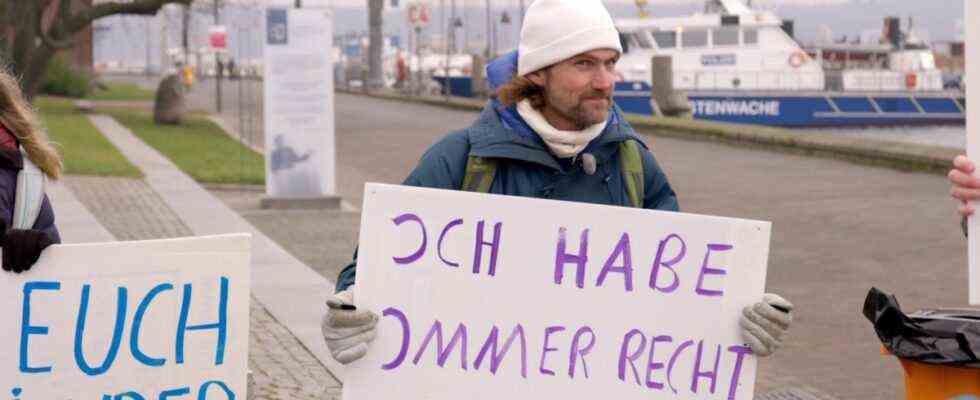You have to live in a strange world of thoughts when you recognize the revenant of the Nazi dictatorship and SED regime in the Federal Republic of Germany and in Angela Merkel the fellow spirit of Adolf Hitler – unfortunately there are quite a few people who see it that way and who have other convictions that are not supported by empirical evidence. How do you get there? Which way leads into the rabbit hole of the conspiracy theoretic underworld? And why is it so difficult for visitors to find their way out again, rather burying themselves deeper and deeper?
In her film Lateral thinkers – how people from the middle radicalize themselves Caroline Schmidt and Svea Eckert are interested in people who have changed during the time of the corona pandemic: These friendly people first became skeptical, then went to demonstrations, spent many hours every day on Telegram, Youtube and Co. and finally saw themselves as Resistance fighters against the system. The film takes the time to trace the individual stages of radicalization without pestering these people and without accusing them on the other hand.
Leif and Jana gain experience like other mussels
We get to know the sailing instructor Leif H. and his girlfriend. You have four children and you seem personable. At the beginning of the film we see how Leif wants to attend a session of the state parliament in Kiel. But he refuses to wear a mask, so nothing comes of it, he is led away from the gallery. On the one hand, Leif tries to exert influence and to get involved in grassroots democracy, tries to make a critical judgment and thus displays qualities that are to be welcomed in a living democracy – but one also sees another trait, an impatience and quiet Aggressiveness. He has already tried various parties and never found a political home. Leif and Jana gain experience like other mussels: Once, in lockdown, the police are on the beach and ask the windsurfers to stop doing their sport. That outraged both of them. They interpret it as a symbol of an impending surveillance state. In this alarmed state, they watch clips and videos in search of a community, evidence and evidence. You’re looking at Ken Jebsen and also produce videos themselves. Later they demonstrated in Berlin and at some point they completely drifted away.
Marcel H. believed in conspiracy theories. In the meantime he has managed to get out of the network bubbles.
(Photo: Alexander Rott / NDR)
The film does not stop at individual stories, but opens up the focus. We get to know Marcel H., a student who went through a similar development at the time of the Ukraine crisis. He makes his profile available to the filmmakers on Facebook. By evaluating his user behavior, you can understand exactly how his political radicalization took place: many hours on the Internet, one post more disturbing than the next. At some point he then compares Merkel with Hitler, he is so convinced that she is behind a sinister plan for a reactionary seizure of power in Kiev. But he also found his way out and today looks in amazement at his career as a net radical on the Russian side. His girlfriend helped him out, today he is involved with the SPD.
In analyzing the mechanisms of radicalization and the dynamics of social conflict, the film adds an important level to the descriptions of the protagonists. In search of confirmation, the skeptics encounter ever harder material on the Internet, and ultimately in the Telegram channels. The film manages to place the lateral thinker phenomenon in a larger cultural and technological context and to ask about the digital radicalization paths. Because one thing is common to all cases: the many hours a day that they spend in front of unchecked offers, the critical use of which they have never learned. Such content is crack for the soul, the lateral thinkers just one of many movements that have emerged in this way.
The story in the first: lateral thinker, ARD, 10:50 p.m.

